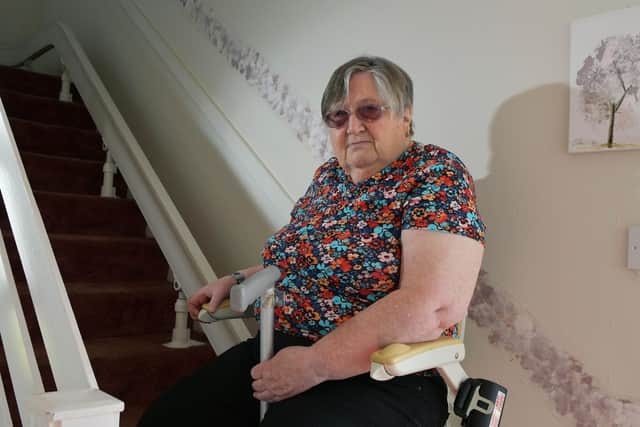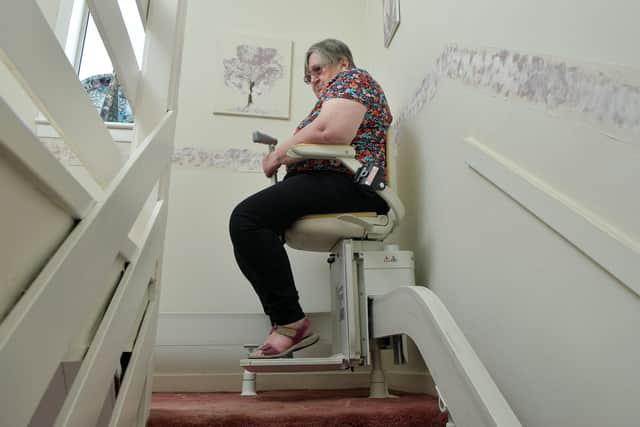Cost-of-living crisis: Disabled Scottish woman says it is becoming 'very, very difficult' to make ends meet
A disabled Scottish pensioner says she is finding it “very, very difficult” to make ends meet, after a new report suggests those with disabilities are some of the worst hit by the cost of energy crisis.
Linda Riley, 73, from Stirling needs to use a range of specialist equipment in her home to help her cope with a number of different conditions.
Advertisement
Hide AdAdvertisement
Hide AdHowever she has recently seen her energy bills soar by £200 every single month, meaning she is having to cut back on “luxuries” like plants for her garden.


This all comes as a new report from Consumer Scotland says governments need to consider that disabled people face increased costs for essentials compared to non-disabled people.
Ms Riley uses an electric hospital bed, a stair lift and has an alarm plugged in for emergencies in case she falls.
All of this is to help her live with a number of conditions, including cerebral palsy, spinal damage, angina, glaucoma and asthma, all of which leave her in “a great deal of pain”.
She said: “The problem is when you need to use all that equipment your electric bills soar up and it is very, very difficult to manage financially.


“Scottish Power have suggested switching this and that off to help, but I am not in a position to do that, I need these appliances.
“I am not the only person coping with this, there will be people all over the place in exactly the same situation.”
Ms Riley, who worked with disabled people for 35 years and later for the Care Inspectorate, says she gets £50 support payments from the government, but this does not go very far to cover her increased costs.
Advertisement
Hide AdAdvertisement
Hide AdShe said: “I am managing to get food in and just about heat the house, but it is the extra things like getting plants for the garden, the things we do to help feel a bit better about ourselves.
“I am 73 and sitting on my own, so you like to have a little bit of something extra like a decent garden and being able to go on holiday.
“I don’t understand much about politics, but I do understand not everyone is in the same position.
“Having worked all this time, you do feel a bit cross about the way things are because it is ridiculous.”
Ms Riley added: “There are people out there with a lot of money trying to make big profits and they have a heck of a lot more money than people like myself.”
Her worries about rising electricity bills comes as a new report from Consumer Scotland found disabled people are more likely to face additional costs and potentially “severe consequences” for their health as a result of the cost of energy crisis.
The report found this is particularly true for people like Ms Riley who need specialist equipment such as stair lifts, beds, electric wheelchairs, ventilators and hoists.
It also highlighted the rising energy costs will also have a knock-on effect on disabled people’s ability to do essential tasks around the house such as washing, laundry and cooking.
Advertisement
Hide AdAdvertisement
Hide AdThe report also conducted a survey which found 52 per cent of disabled people say they are unable to heat their homes to a comfortable level compared to 36 per cent of non-disabled people, and 47 per cent report struggling to keep up with their energy bills compared to 29 per cent of non-disabled people.
A further 47 per cent of disabled people say they have had to cut back on food compared to 32 per cent on non-disabled people, and 72 per cent say the energy crisis has had an impact on their mental health and 68 per cent said the same about their physical health. This is compared to 64 per cent and 54 per cent of non-disabled people.
Grace Remmington, energy policy manager at Consumer Scotland, said: “Our initial evidence suggests disabled people may not be sufficiently covered by current social support or energy crisis support.
“The findings have highlighted the need for the government and the energy sector to identify where there may be future opportunities to provide greater support for disabled people who rely on energy to meet their essential needs.
“In the longer term, future affordability interventions should consider the fact that some disabled people face increased essential costs.”
A spokesman for the UK Government said: “We know this has been a difficult time for families, including those living with a disability, which is why the government has covered around half of the typical household’s energy bill over winter.
“We are providing additional support to the most vulnerable, with an extra £150 for disabled people and £900 for those on means-tested benefits.
“We welcome the recent reduction in the price cap and will continue to monitor energy prices and keep support schemes under review.”
Scottish Power said they were unable to comment.
Comments
Want to join the conversation? Please or to comment on this article.